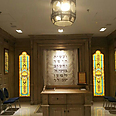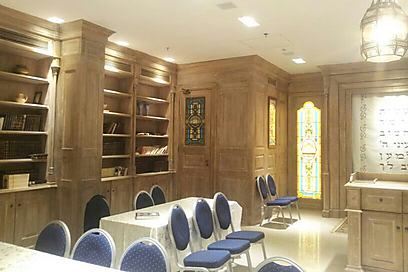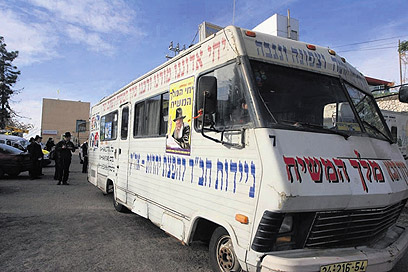
Join quorum, get $700 in cash
IDF bases looking for families to spend High Holidays with soldiers, prisons searching for prayer leaders, Chabad 'operations tanks' reach every corner in Israel – and even in China yeshiva students are offered quite a lot of money to take part in public prayer service
We found the most tempting offer on Yossi Hoffman's Facebook page, where he wrote: "We urgently need Sephardic guys willing to pray on Rosh Hashana in China, including flights, accommodation and an allowance of $700."
Rabbi Benny Chen of Jerusalem, 48, who works in real estate, has been serving in the past four years as the rabbi of the Sephardic community in Guangzhou, a port city in southern China which attracts businesspeople from all over the world. The place has a Chabad emissary, but there is also a Sephardic community which established a magnificent synagogue about six months ago, named after Meir Haim Yifrach.
"Ahead of Rosh Hashana, we wanted the prayer to be held in a joyful and special atmosphere," says the rabbi," and so the community's donors were willing to fund the transport of seven guys who would come here from Israel, from the Mir and Shitrit Yosef yeshivot. All expenses are covered by us of course: Flights, accommodation, food, and each receive an allowance of $700 as well.

Synagogue in Guangzhou, China. Allowance of $700 plus full accommodation, including flights
"Thanks to donations we serve free kosher meals, every day, in the morning and in the evening, after the prayer," Rabbi Chen adds. "When there are major exhibitions we host up to 200 businesspeople from Israel, the United States and Europe, and Jews who moved to China to make a living.
"We are not asking the guests for any donation for the food or accommodation, neither on weekdays nor on Shabbat and holidays. The amazing thing is seeing our Shabbat meal when they start singing Shabbat songs at the end of the meals, and sometimes the singing goes on for three or four hours."
'Operations tank'
Rabbi Shlomo Margaliot, CEO of the Chabad patrol vehicles, also known as the "operations tank," sends a number of teams every year to communities in need of cantors and shofar blowers. This year five vehicles are being sent to the moshavim of Ein Ayala and Bat Shlomo and to three IDF bases.

'It's hard to find guys who are not shy and know how to blow the shofar and read from the Torah.' Mitzvah tank (Illustration photo: Hagai Aharon)
Well, "vehicle" is a slightly general word. It is actually a huge caravan equipped with a toilet, a shower, a fridge, folding beds, prayer books and, of course, Chabad information leaflets.
In addition, there is food and drinks, including grapefruit for Kiddush, which are enough for the two days of Rosh Hashana and Shabbat for the three team members. As the caravan's engine does not work during the holiday, the vehicle is connected to electricity to supply lighting and power for the fridge and air conditioner.
"We are usually approached by many yeshiva students who want to take part in the activity. The problem is that during the holidays, many Chabad Hasidim fly to 770 (the Lubavitcher Rebbe's house) in New York, and it's hard to find guys who are not shy and know both how to blow the shofar and how to read from the Torah. That's why they get an allowance of some NIS 300 (about $82) per person.
"But the truth is that they work very hard, because after the prayer they go to senior citizens' homes and, medical centers and other places, in order to give Jews the opportunity to blow the shofar."
Praying with criminals
T. is a yeshiva student, a Chabad Hasid, who in recent years has been serving as cantor in several prisons. He says he got NIS 1,500 ($410) for Rosh Hashana and Yom Kippur prayers.
"It was an amazing and unique experience praying with prisoners," he says. "First of all, when you say in the Kol Nidrei prayer, "We permit praying with prisoners," every word has a special meaning.
"The prayer there is said intentionally, because the prisoners who arrive for the prayer have a lot to ask God for. On the other hand, they have no patience for long prayers, so a yeshiva student who comes there must be aware of the identity of his target audience in advance."
Is there any fear of the prisoners?
"In principle, the warden is instructed not to lock the door in the place we pray in, and to keep eye contact with us. But after one of the prayers, I approached the door and discovered that it was locked. I suggested to the prisoners that we study some of the holiday laws together, and that's what we did, until one of them asked me: 'Well, distinguished rabbi, what is it like sitting in jail?!'"
Army becomes your home
In exceptional cases the hunt is not only for yeshiva students, but also for religious families willing to stay at IDF bases on Rosh Hashana.
The Mahane Meshutaf ("joint camp") organization, in coordination with the IDF Chief Rabbinate, looked for families in which the father can read the Torah, explain to the soldiers about the holiday traditions and deliver Torah lessons.
The operation's organizers stated that they prefer families in which the men can both read from the Torah and serve as cantors. As staying in a base for three days in a row is not what many people wish four, the operation's organizers promised a "decent scholarship" to those who answer the call, as well as "conformed and organized accommodation."










